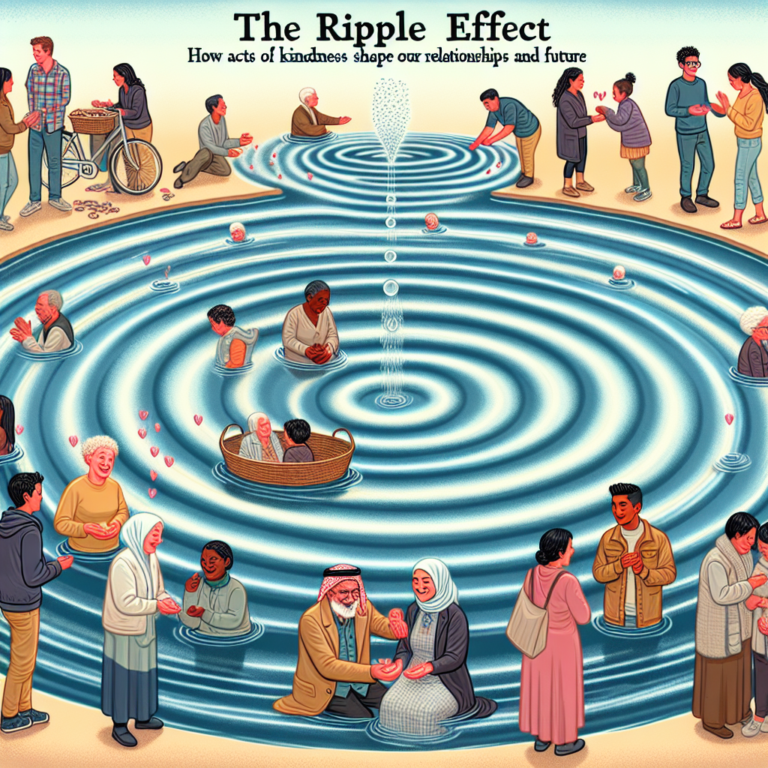Karma, a concept steeped in the philosophies of Hinduism and Buddhism, refers to the principle of cause and effect, where every action has a corresponding reaction. While traditionally applied in a spiritual context suggesting that good deeds lead to positive outcomes and bad deeds lead to suffering, the modern interpretation of karma transcends religious boundaries. It encompasses the idea that our actions profoundly impact our well-being and that cultivating positive behavior can lead to a more fulfilling and joyful life.
Understanding Karma
At its essence, karma represents the interconnectedness of actions and consequences. It teaches that every decision we make, every word we speak, and every thought we harbor can resonate through our lives and affect our circumstances. In Western psychology, this idea parallels concepts like cognitive behavioral therapy, which emphasizes the influence of thoughts and actions on emotional states and overall mental health.
Karma is not just about retribution or rewards; it is also about learning and growth. Life experiences shape our perspectives, foster resilience, and promote compassion. By understanding the karmic cycle, we can better navigate our lives, making conscious choices that lead to healthier relationships and emotional well-being.
The Impact of Actions on Well-Being
1. Positive Actions Lead to Positive Outcomes
When we engage in positive actions—such as showing kindness, practicing gratitude, and helping others—we create a ripple effect that can improve our emotional landscape. Scientific studies have shown that altruistic behaviors can lead to increased happiness. For example, volunteering or offering support to others not only benefits the recipient but also fosters a sense of purpose and fulfillment within the giver. When we make a concerted effort to do good, we cultivate a positive environment, enhancing our overall well-being.
2. The Role of Intentions
The intentions behind our actions are equally significant. Acting with genuine compassion and a sincere desire to contribute positively can magnify the benefits of our deeds. In contrast, if our actions are rooted in selfishness or ulterior motives, they may not yield the same positive results. Mindfulness, or the practice of being present and intentional, helps us align our actions with our values, leading to a deeper sense of satisfaction and peace.
3. Breaking Negative Cycles
Karma’s healing power lies in its capacity to break negative patterns. When we recognize the connections between our actions and their outcomes, we can consciously choose to alter our behaviors. For instance, if we acknowledge that negativity breeds more negativity, we can work towards cultivating positive habits—such as practicing forgiveness or fostering a forgiving mindset. By making these shifts, we can transform our relationships and our internal dialogue, ultimately leading to improved mental health.
Karma and Emotional Healing
The concept of karma can also act as a therapeutic lens through which to view emotional pain and trauma. Events in life that seem unfair or hurtful can be reframed through the understanding of karmic lessons. Rather than viewing suffering as merely punitive, we can see it as an opportunity for growth and understanding. This shift in perspective can empower individuals to take charge of their healing, fostering resilience and hope.
1. Healing Relationships
Repairing fractured relationships often requires recognizing our role in the dynamics at play. By taking responsibility for our actions, we can pave the way for reconciliation. Karma teaches us that relationships are a dance of give and take; when we initiate positive actions—such as expressing empathy or seeking forgiveness—we invite healing not only for ourselves but also for others involved.
2. Cultivating Self-Compassion
Part of harnessing the healing power of karma is learning to treat ourselves with kindness and understanding. When we make a mistake, instead of chastising ourselves, we can adopt a learning mindset. Recognizing that errors are a part of the human experience enables us to develop self-compassion, which is crucial for emotional well-being. This approach helps dissolve feelings of guilt and shame, paving the way for healing.
The Ripple Effects of Karma
One of the most profound aspects of karma is its ripple effect on the community and the world. When we foster kindness, we inspire others to do the same, creating a cycle of positivity. Think about the chain reactions we experience daily: a small act of kindness, like holding a door open for someone, can radically change the trajectory of that person’s day. When we contribute positively to our surroundings, we enhance not only our well-being but the well-being of those around us.
1. Building a Supportive Community
In today’s world, where connection is paramount, creating a positive environment is essential for mental health. Through our actions, we have the power to build supportive networks that uplift individuals. As we practice compassion, we encourage others to engage in similar behaviors, cultivating a community rooted in empathy and mutual support.
2. Global Perspective
On a broader scale, the collective actions of individuals can lead to societal changes. When we stand for social justice, advocate for environmental sustainability, and support ethical practices, we contribute to a healthier planet and society. The positive karma generated through collective action encourages a sense of unity and shared responsibility, significantly impacting our global well-being.
Conclusion
The healing power of karma emphasizes the profound truth that our actions matter. By fostering positive behaviors and nurturing a compassionate mindset, we can shape our emotional and mental landscapes. The interconnectedness of our actions serves not only to enhance our well-being but to contribute positively to the world around us. Embracing the principles of karma allows us to take charge of our lives, break patterns of negativity, and pave the way for healing and growth.
FAQs
Q: What is the primary teaching of karma?
A: Karma teaches that every action has a consequence—positive or negative. Our choices directly shape our experiences and well-being.
Q: Can karma influence mental health?
A: Yes, engaging in positive actions can improve mental health by fostering joy, purpose, and supportive relationships, while negative actions can lead to emotional turmoil.
Q: How can I harness the healing power of karma in daily life?
A: You can practice mindfulness, engage in acts of kindness, cultivate self-compassion, and create positive intentions behind your actions.
Q: Is karma only about past actions?
A: While karma considers past actions, it is also about the present—how you act now can shape your future experiences.
Q: How can understanding karma help in dealing with trauma?
A: Understanding karma allows individuals to reframe their experiences, seeing challenges as opportunities for growth rather than mere punishment. This shift can empower healing and foster resilience.
It seems like you might be looking for a writing prompt or an idea to get started on something. Could you please provide a bit more context or specify the type of prompt you’re interested in? For example, are you looking for a creative writing prompt, a business idea, a research topic, or something else?, #Healing #Power #Karma #Actions #Shape #WellBeing, #Healing #Power #Karma #Actions #Shape #WellBeing, 1736199327, the-healing-power-of-karma-how-our-actions-shape-our-well-being





